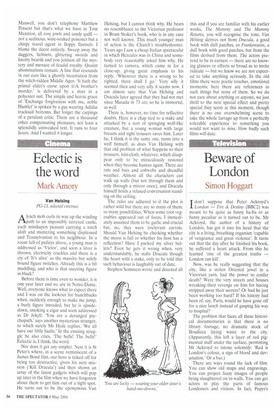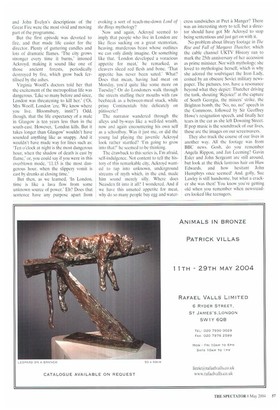Beware of London
Simon Hoggart
T don't suppose that Peter Ackroyd's 1 London — Fire & Destiny (BBC2) was meant to be quite as funny ha-ha or as funny peculiar as it turned out to be. Mr Ackroyd, the author of a history of London, has got it into his head that the city is a living, breathing organism 'capable of vengeance and great violence'. It turns out that the day after he finished his book, he suffered a heart attack. From this he learned 'one of the greatest truths — London can kill'.
Now, was he really suggesting that the city, like a stolen Oriental jewel in a Victorian yarn, had the power to confer death? Were the very streets and houses wreaking their revenge on him for having stripped away their secrets? Or had he just been working too hard? If his history had been of, say, Paris, would he have gone off for a nice lunch instead of gasping his way to hospital?
The problem that faces all these historical documentaries is that there is no library footage, no dramatic stock of Boudicca laying waste to the city. (Apparently, this left a layer of red pigmented stuff under the surface, permitting Mr Ackroyd to intone solemnly: 'Red is London's colour, a sign of blood and devastation.' Or a bus.) There are ways round the lack of film. You can show old maps and engravings. You can project fuzzy images of people being slaughtered on to walls. You can get actors to play the parts of famous Londoners and visitors. In fact, Pepys's and John Evelyn's descriptions of the Great Fire were the most vivid and moving part of the programme.
But the first episode was devoted to fire, and that made life easier for the director. Plenty of guttering candles and lots of dramatic flames. 'The city grows stronger every time it burns.' intoned Ackroyd, making it sound like one of those ancient forests, periodically destroyed by fire, which grow back fertilised by the ashes.
Virginia WooIfs doctors told her that the excitement of the metropolitan life was dangerous. 'Like so many before and since, London was threatening to kill her.' ('Oi. Mrs Woolf, London 'ere. We know where you live. Bloomsbury, innit?') Odd. though, that the life expectancy of a male in Glasgow is ten years less than in the south-east. However, 'London kills. But it takes longer than Glasgow' wouldn't have sounded anything like as snappy. And it wouldn't have made way for lines such as: 'Ten o'clock at night is the most dangerous hour, when the shadow of death is cast by flame,' or, you could say if you were in this overblown mode, '11.15 is the most dangerous hour, when the slippery vomit is cast by drunks at closing time.'
But then, as we learned, 'In London, time is like a lava flow from some unknown source of power.' Eh? Does that sentence have any purpose apart from
evoking a sort of reach-me-down Lord of the Rings mythology?
Now and again, Ackroyd seemed to imply that people who live in London are like fleas sucking on a great stentorian, heaving, murderous beast whose outlines we can only dimly imagine. Or something like that. 'London developed a voracious appetite for meat,' he remarked, as cleavers sliced red flesh and bone. 'That appetite has never been sated.' What? Does that mean, having had meat on Monday, you'd quite like some more on Tuesday? Or do Londoners walk through the streets stuffing their mouths with raw beefsteak as a between-meal snack, while prissy Continentals bite delicately on patisserie?
The narrator wandered through the alleys and by-ways like a well-fed wraith, now and again encountering his own self as a schoolboy. Was it just me, or did the young lad playing the juvenile Ackroyd look rather startled? 'I'm going to grow into that?' he seemed to be thinking.
The drawback to this series is, I'm afraid, self-indulgence. Not content to tell the history of this remarkable city, Ackroyd wanted to tap into unknown, underground streams of myth which, in the end, made him sound merely silly. Where does Neasden fit into it all? I wondered. And if we have this unsated appetite for meat. why do so many people buy egg and water
cress sandwiches at Pret a Manger? There was an interesting story to tell, but a director should have got Mr Ackroyd to stop being sententious and just get on with it.
No problem about library footage in The Rise and Fall of Matgaret Thatcher. which the cable channel UKTV History ran to mark the 25th anniversary of her accession as prime minister. Nor with mythology; she loved to mythologise herself, which is why she adored the soubriquet the Iron Lady, coined by an obscure Soviet military newspaper. The pictures, too, have a resonance beyond what they depict: Thatcher driving the tank, shouting 'Rejoice!' at the capture of South Georgia, the miners' strike, the Brighton bomb, the 'No, no, no!' speech in the Commons, followed by Sir Geoffrey Howe's resignation speech, and finally her tears in the car as she left Downing Street. If pop music is the soundtrack of our lives, these are the images on our screensavers.
They also track the course of our lives in another way. All the footage was from BBC news. Gosh, do you remember Angela Rippon, and Jan Leeming? Gavin Esler and John Sergeant are still around, but look at the thick lustrous hair on Huw Edwards, and how hesitant John Humphrys once seemed! And, golly, Sue Lawley is still handsome, but what a cracker she was then! You know you're getting old when you remember when newsreaders looked like teenagers.













































































 Previous page
Previous page